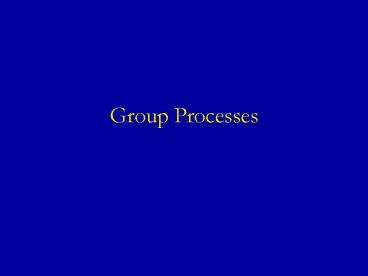Group Processes PowerPoint PPT Presentation
1 / 22
Title: Group Processes
1
Group Processes
2
Two Types of Group Influence
- collective social influence
- engaged in common activities but with minimal
direct impact - nonsocial groups
3
Two Types of Group Influence
- collective social influence
- group influence
- two or more people are interdependent upon one
another - social groups
4
Collective Social Influence
- social facilitation theory
- Norman Triplett -- observed cyclists
- study of children with fishing reels
- presence of others increases nervous energy and
enhances performance
5
Collective Social Influence
- social facilitation theory
- presence of others creates physiological arousal
- enhances ability to perform dominant response
- e.g., singing -- good or bad
(Zajonc et al., 1969)
6
Collective Social Influence
- social facilitation theory
- studies with cockroaches
- Does the presence of other cockroaches facilitate
or inhibit their movement away from the light? - Does it differ by the complexity of the task?
(Zajonc et al., 1969)
7
Collective Social Influence
- mere presence effect
- the mere presence of others is enough to produce
social facilitation effects - but
8
Collective Social Influence
- evaluation apprehension effect
- others are potential evaluators
- work on task alone, presence of two other
participants, or two blindfolded participants - dominant responses the same in alone and
blindfolded conditions
(Cottrell et al., 1968)
9
Collective Social Influence
- distraction conflict effect
- nothing uniquely social about social facilitation
- anything that distracts our attention (e.g.,
blaring music, glittering lights) can elicit
social facilitation effects
10
Collective Social Influence
- social loafing
- Max Ringelman -- cart pushing and rope pulling
- Ingham et al. (1974)
- participants blindfolded
- pulling rope machine alone or with others
- pulled 20 harder when they thought they were
alone - Latané et al. (1979)
- exerted less effort in clapping and cheering in a
group
11
Collective Social Influence
- invasion of personal space
- move away and reestablish boundaries
- compensatory behaviors that minimize closeness
- people avoid invading space of others
- gestures and apologies to minimize impact
12
Collective Social Influence
- invasion of personal space
- study of arousal hypothesis in mens bathroom
- urinals provide a natural invasion of privacy w/o
the ability to engage in compensatory behaviors - urination is a process sensitive to arousal
- onset of urination should be delayed
- duration of urination should be shortened
(Middlemist et al., 1976)
13
Collective Social Influence
Dont use, washing urinal
bathroom stall
(Middlemist et al., 1976)
14
Collective Social Influence
Dont use, washing urinal
bathroom stall
(Middlemist et al., 1976)
15
Collective Social Influence
Dont use, washing urinal
Dont use, washing urinal
bathroom stall
(Middlemist et al., 1976)
16
Collective Social Influence
(Middlemist et al., 1976)
17
Collective Social Influence
- deindividuation
- presence of a crowd can affect individual
members behavior with negative consequences - loosening of normal behavioral restraints
- size of group can render people unidentifiable
- less self-aware and self-conscious
- the larger the mob, the more vicious the violence
(Mullen, 1986)
18
Group Influence
- social groups
- e.g., family, friends, church or religious
organization, co-workers, campus organizations - group norms
- roles within the group
19
Group Influence
- groupthink
- decision-making process characterized by
excessive needs for group cohesion and consensus - Groupthink
- antecedents
- symptoms
- suggestions for avoiding groupthink
20
Group Influence
- group polarization
- Do groups make more conservative or riskier
decisions than individuals? - conventional wisdom in 60s -- more conservative
decision - group decisions tended to be riskier than
individual decisions (Stoner, 1961) - risky shift phenomenon
- conservative shift
21
Group Influence
- group polarization
- group discussion tends to exaggerate the initial
leanings of the individual group members - persuasive arguments within the group
- social comparison within the group
22
Conclusion
- mere presence of others can affect our behavior
by increasing our arousal - presence of others may decrease our effort if we
wont be evaluated - invasion of personal space increases arousal
- group decision-making can be error prone and
polarizing

